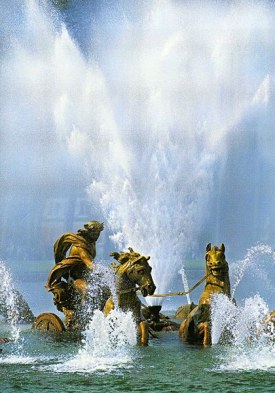Palace of Versailles
 From 1682 to 1789, the Palace of Versailles was the symbol of absolute
monarchy in France. Previous French kings may have held the job title 'king'
but their power was mainly limited to Paris. Regional Dukes, in Burgundy for
example, were often richer than the King, maintained their own armies and
levied their own local taxes. It was Louis XIV, the self-proclaimed "Sun
King", who decided 'enough already' and conceived Versailles as his central
power base.
From 1682 to 1789, the Palace of Versailles was the symbol of absolute
monarchy in France. Previous French kings may have held the job title 'king'
but their power was mainly limited to Paris. Regional Dukes, in Burgundy for
example, were often richer than the King, maintained their own armies and
levied their own local taxes. It was Louis XIV, the self-proclaimed "Sun
King", who decided 'enough already' and conceived Versailles as his central
power base.
Louis liked to get out of Paris from time to time and go hunting in the forests near the village of Versailles. Paris was too big for him to control and he could never be sure what everyone was thinking. If he moved his entire court out of Paris and under his own roof, he reckoned, he could keep tabs on everyone. Louis came up with a three-point plan. 1) His new palace at Versailles would be the most opulent, awe-inspiring palace the world had ever seen, and would make it clear who was 'top dog'. 2) All the top-flight nobility (especially the Dukes of Burgundy) would be required to live at Versailles for several months of the year. This would keep them uselessly occupied and unable to maintain their own regional power-base. 3) How to keep them uselessly occupied at Versailles? Etiquette!
 Etiquette dictated that the most favoured at court would be granted
permission to watch the King get up every morning. Nobles who might once
have plotted against the king now toadied in his bedroom every morning, in
the hope, one day, of being allowed to fetch his slippers. There were even rules
for the correct way to sit down in a chair. Failure to do so properly would
result in demotion in the court pecking-order, and suddenly you were the man
who gave the king's slippers to the man who gave the king's slippers to the
man who gave the king his slippers.
Etiquette dictated that the most favoured at court would be granted
permission to watch the King get up every morning. Nobles who might once
have plotted against the king now toadied in his bedroom every morning, in
the hope, one day, of being allowed to fetch his slippers. There were even rules
for the correct way to sit down in a chair. Failure to do so properly would
result in demotion in the court pecking-order, and suddenly you were the man
who gave the king's slippers to the man who gave the king's slippers to the
man who gave the king his slippers.
Male courtiers were forbidden to do any private work other than fencing and dancing practice. Female courtiers meanwhile, wore vast hooped skirts, which rendered them incapable of any activity apart from a little light embroidery if they were feeling particularly energetic. Etiquette soon spread to all the courts of Europe and persists to this day in England (but remember, it's only to prevent Prince Michael raising a private army in Kent).
Louis XVI (Louis XIV's grandson) left Versailles in a hurry on 6th October 1789. Given that the Revolution had started in July, I'd have got out a good deal sooner, but if you believe you're king by divine right, you probably think differently. The Great Hall of Mirrors has since served as a popular venue for signing treaties - most famously, the 1919 Treaty of Versailles, which punished Germany so hard for World War One that it virtually guaranteed there'd be a re-match.
Versailles is open to the public every day except Monday, and admission costs a very egalitarian €8. If you get tired at any point during your visit, be sure to sit down in the correct way. There'll be someone watching.